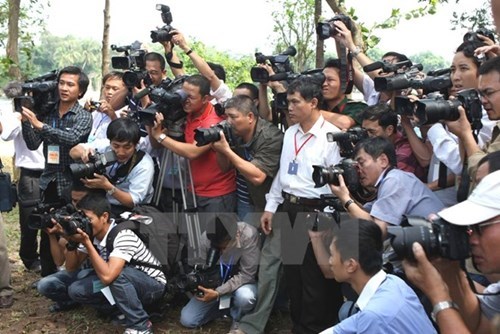    |
 |
|
Media play an important role in protecting human rights in Vietnam. Photo for illustration |
Vietnam is a small country on the world map. This is a country that has experienced many wars, embargos and sanctions, and what peace has brought back in recent years is illustrated through the lens of the media and the right to access to information shows that Vietnamese citizens further enjoy human rights and citizens’ rights, all of which are recognized by the international community.
The media circle in Vietnam plays an important role in this process.
According to the Ministry of Information and Communications, by June 2017, the country had 982 registered media agencies, including 193 newspapers, 639 magazines, and 150 online media. The statistics also reveal that over 17,000 journalists were granted press cards.
This number of media agencies represent voices of all associations, organizations, professional groups etc., so in short, everyone has a chance to voice their concerns via the mass media.
Protecting, ensuring, and struggling in the field of human rights and citizens’ rights are closely monitored by the Party and State. Apart from promoting the role of the National Assembly, Government, and legislative agencies, the role of the media is significantly important.
Emphasizing regulations of the Constitution 2013 on human rights, the Law on Media 2016 vividly reflects the relationship between human rights and the right to freedom of the press, and freedom of expression via the media, of each citizen. Meanwhile, it also clearly shows the advantages of the media in protecting and ensuring human rights and citizens’ rights, disseminating viewpoints and guidelines of the Party, laws and policies of the State on human rights, and fighting against distorted arguments of the hostile forces in the field of human rights.
The facts proves that although the policy of the Party and State in protecting and ensuring human rights and citizens’ rights are good, they find it hard to reach ordinary people without the role of the media.
For example, Vietnam has 64 ethnic groups so that when a new law is enacted it is very difficult to disseminate it to all groups immediately. Despite facing many obstacles, the Party and State always give priorities to ensure every citizen, regardless of his or her ethnicity, can access newly-enacted legal documents or policies, even those who live in remote and mountainous areas.
In 1991, the Prime Minister decided to give free newspapers to mountainous localities or those with special difficulties. In 2001, the Prime Minister issued Decision 1637/QD-TTg on providing for free, certain newspapers and magazines to ethnic minorities and mountainous localities. When Decision 1637 lapsed, the Prime Minister issued Decision 975/QD-TTg to continue to provide free newspapers and magazines for those living in these areas in an effort to give them timely information for socio-economic development. Importantly, this decision increases the number of free newspapers and magazines to 24 publications of 19 media agencies and broadens those groups eligible to benefit from it. This is a wise policy and demonstrates the practical care of the Party and State to boost the social and spiritual lives of the ethnic minorities and meet their demands.
According to the Committee for Ethnic Minorities Affairs, 100% of these publications are delivered to the right individuals in time with good editorial content. The news and features of these publications are short with good layouts, easy to read, understand and remember, and suitable for ethnic people.
Those are policies of the Party and State for ethnic minorities in terms of information. In reality, 50 out of 90 million Vietnamese people use Internet. This is evidence that the media is a bridge that reflects people’s desires and rights.
However, ensuring human rights and citizens’ rights does not mean accepting wrong things. The media also plays an important role in providing accurate and truthful information for the people to adjust their behavior. In recent years, the media agencies have proactively exposed and fought against corruption, social evils, or abuses of power or authority to violate human rights and citizens’ rights. Many negative cases relating to governance or judicial activities that were reported by the media forced government agencies to review the cases to ensuring legal interests of citizens and the State.
The media also helps orient the public to fight against distorted arguments on human rights. Recently, hostile forces have wrongly accused Vietnam of cracking down on political activists, journalists, bloggers; or limiting freedom of expression on the Internet, freedom of association, demonstrations, freedom of religion etc. Those arguments can be persuasive if one is not vigilant. However, the Vietnamese media are strong enough to provide accurate and truthful information to the public, helping the people understand the nature of the issues, and foiling bad plots of the hostile forces.
The Vietnamese media sector is young but what it has brought about for the people clearly proves that human rights and citizen rights in Vietnam are openly reflected in details of all occupations. Human rights in Vietnam have increasingly been assured and the media is a tool to vividly illustrate this reality.
Translated by Nam Long